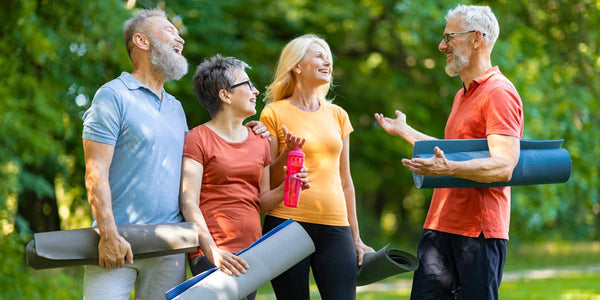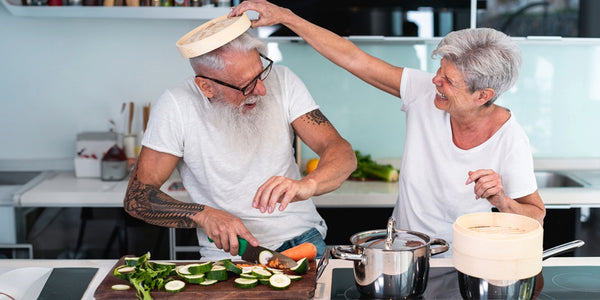Your Cart is Empty
Injury
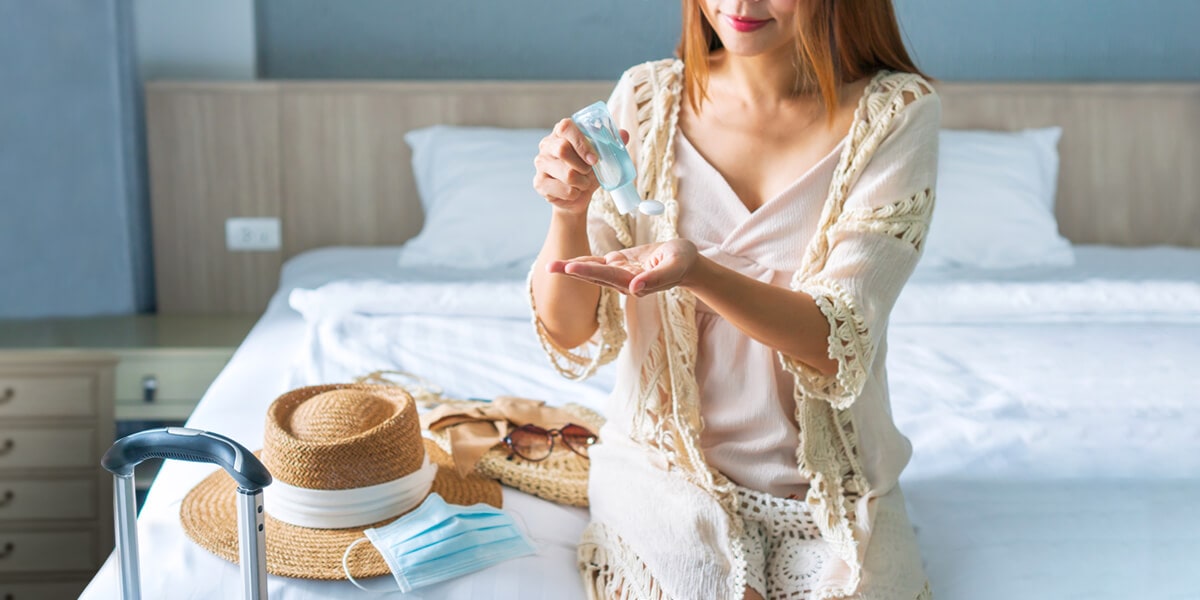
There are lots of reasons why people travel. Whether you’re on vacation, traveling for work, or even retired, it’s important to prioritize your health. We know healthy travel can be tricky when you’re out of routine or indulging in celebrations and that staying healthy spans far beyond “working out”. To help, we put together this list packed with ideas, tools, and gadgets to keep you on track. Even when you’re busy taking on new adventures!
It’s not a vacation without snacks. Be cognizant of what you pack for the plane or car and choose options high in protein, nutrients, and good fats to keep your body feeling energized. Sugary snacks will leave you feeling sluggish and weaken your immune system.
Some healthy travel snacks include; nuts, fruit, trail mix, energy bites, veggie chips, popcorn, protein bars, and string cheese.

Stretching keeps your body limber and adding it into your daily routine is important regardless of our traveling situations. Combat long bouts of sitting with rebound stretches that will improve common aches like lower back pain, neck pain, and tight hips. We love using a stretch strap to progress through and achieve more targeted stretches, they also roll up and store away easily for travel.
Try these beginner yoga stretches.

If you’re on vacation, working out might not sound like an ideal activity. However, don’t knock it so quickly. Not skipping your workouts (even on vacation) can improve your mood, increase energy levels, and aid in digestion.
When you travel search the area for local gyms. Most run specials for a free week trial. Large chains allow you to work out at any location, so if you travel frequently you may want to consider joining one for easy access.
Getting to a gym while you travel may be difficult for a number of reasons. As an alternative, we recommend putting together your own set of travel workout equipment. This would include items that store and transport easily such as; a yoga mat, resistance bands, wrist or ankle weights, pedal exercisers, and balance discs.

Fitness trackers are also a really great way to track your progress and hold yourself accountable for hitting goals. This fitness tracker comes with a free downloadable app to track your data and provides both instructor lead and scenic workouts to follow along with.
YouTube is also a great place to search for a variety of instructor lead workouts you can do anywhere with little equipment.
Compression provides relief from joint pain, muscle soreness, and poor circulation. It can be applied to almost anywhere on your body with the use of sleeves, stockings or gloves.
If your hands ache while you drive, arthritis gloves can provide warming compression that boosts blood circulation to reduce pain from carpal tunnel or arthritis.
Compression sleeves can be worn over vulnerable joint areas like the knees, elbows, wrists, and ankles.

Just like the arthritis gloves these sleeves provide gentle compression and mild support to improve circulation.
When you travel for a long period of time, the sedentary time span can cause your body to build up fluid and swell. This is especially common on flights, due to pressure in the cabin you’re even more likely to experience swelling and discomfort. Compression stockings are great for this and should be worn during the flight. These also help to reduce restless leg syndrome and general aches or soreness.
Learn More About Compression Therapy
Important vitals to track when you travel include:
With COVID, now more than ever it’s important to routinely check your temperature, especially if you aren’t feeling well and suspect you may be running a fever. This will help protect you and others.

A pulse oximeter can easily measure your SpO2 to get a picture of your lung health. Also, keep in mind that changing elevations can greatly influence your oxygen level
We should all be routinely checking our blood pressure to ensure heart health. Having a personal blood pressure monitor, like this one, is convenient to have when you’re spending long periods away from home that delay doctor’s visits. Being able to monitor your own blood pressure can also open the doors to remote patient monitoring or TeleHealth appointments.
This can be measured manually, using a pulse oximeter, or even with a digital blood pressure monitor. A normal, healthy, adult heart beats on average 60-100 beats per minute. Understanding your heart rate can help to identify illnesses or developing conditions.
Vacations and travel always include indulging and sometimes overeating. It’s ok to enjoy yourself, but over time you should track your weight to avoid any unwanted weight gain or loss.
If you have current existing conditions, monitoring these vitals are even more important. Learn More About Tracking Important Vital Signs
Reservations, travel arrangements, and time changes can easily throw you off your sleep schedule and they are pretty much unavoidable. The good thing is that you can plan ahead of this.


8 cups of water a day is the “golden rule”, but if you’re staying active, exploring, hiking, walking long distances, or spending time in climate conditions your body is not used to then consider upping your intake.
There are fun water bottles you can buy that are labeled with goals based on time and quantity for your daily intake of water. Some even with motivational quotes.

Skin health plays a huge role in your overall wellness. Your skin is your body’s barrier and protects you from harmful agents. Here are some ways to keep it healthy.
Whether you’re driving or riding in a car or plane, long stretches of sitting can cause back, neck, hip, and leg pain. Luckily there are a wide variety of seat cushions and lumbar supports designed to alleviate pressure off our vulnerable joints and even improve posture. Check out a few different ones here.
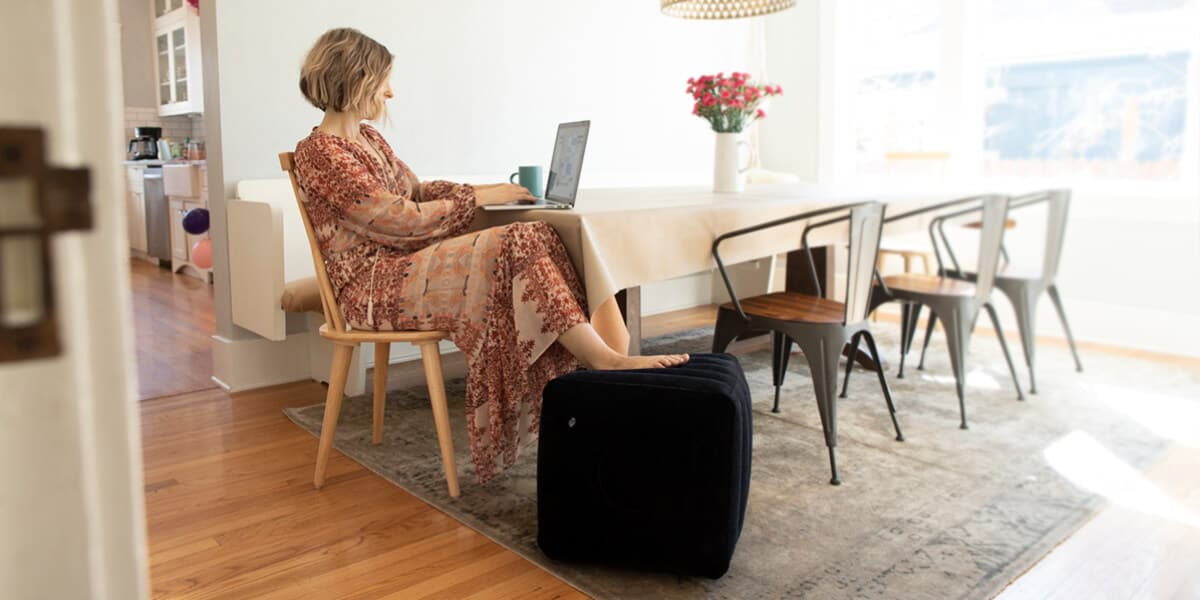
If you’re not driving, you can take the comfort level up a notch by adding an inflatable footrest, light blanket, or even a black out eye mask and headphones.
Making sure your comfortable during travel will help prevent common pain that might occur after a big trip.
Self-care is a pretty broad term and there are a lot of ways to go about it (including pretty much every tip in this article). Some additional ways you can focus on taking care of yourself include:

Sitting too long can cause your muscles to become stiff and sore. Additionally, high levels of activity you’re not used to, like hiking, can also cause muscle soreness. Self-massage is easy to perform when you have the right tools. Tens units, cold rollers, and massage sticks are all small enough to travel and help provide pain relief.
It’s important to stay organized with your health while traveling. It can be easy to miss medications or supplements when out of your normal routine. Set an alarm on your phone and be sure to use a pill organizer to conveniently store and transport your daily medications.
When you’re on vacation you shouldn’t be stressed, but traveling is oftentimes stressful. Set aside time to unwind when you arrive to your final destination. This acupressure mat rolls up like a yoga mat. Comprised of over 7,000 spikes these mats provide deep tissue massage, promote blood circulation, stress relief and relaxation for your mental health.

When traveling and taking on new adventures you should always consider safety. Make sure you have a first aid kit easily accessible in case of emergencies. You can easily carry this travel one around with you anywhere. Having pain cream on hand can also provide pain relief from any muscle or joint soreness.
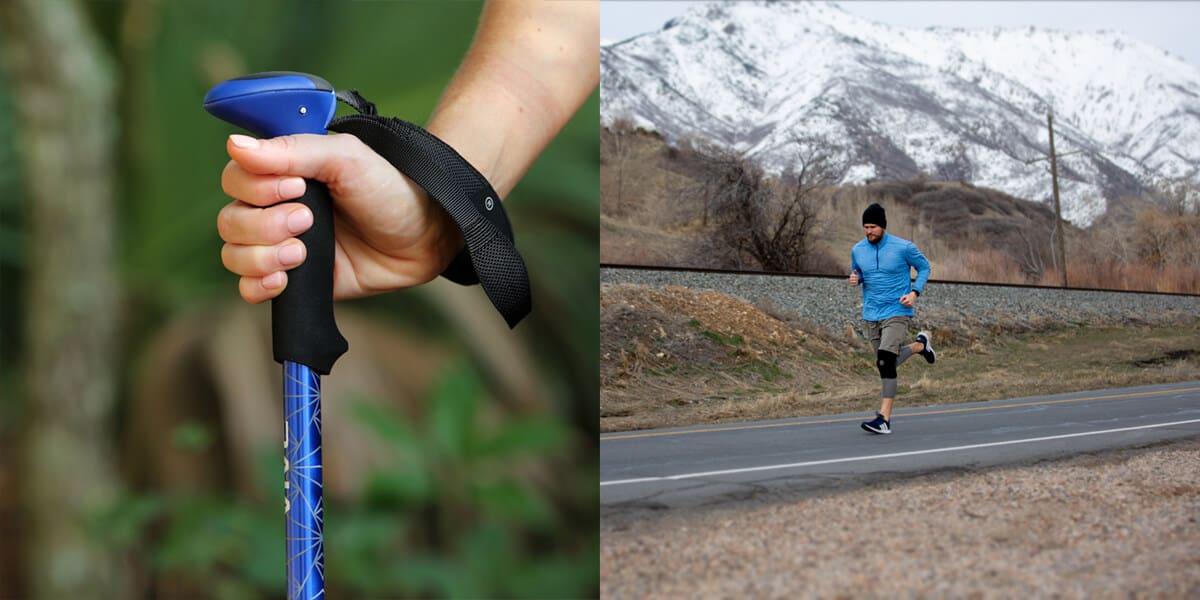
If you plan on spending lots of time out on the trails, exploring large areas, or walking the city you should plan ahead for any assistance you may need.
These trekking poles can be used for uneven terrains and trail paths to help you stay balanced and provide extra support so you can venture further. They also collapse and pack away into a convenient travel bag.
Oh, and don’t forget supportive footwear, or you can add insoles for extra comfort and support when you know you’ll be getting lots of steps in.

If the plan is to travel often and for long periods of time, look into purchasing travel health insurance. This covers most emergency medical expenses when you’re on a trip. Plans will often cover costs of doctor bills, ambulance services, operating room charges, imaging, exams, lab tests, treatments, drugs, medications, and even dental care (limitations may apply)
Regardless of your reason for travel, it’s important to prioritize your health both mentally and physically. Next time you’re planning a trip, check this list and make sure you’re not forgetting to take care of your health.
Shop Travel Products
![The Benefits of Flexibility [A.K.A. The Secret Sauce for Aging]](http://www.vivehealth.com/cdn/shop/articles/Smiling-retired-woman-listening-to-music-while-stretching-legs-outdoors._600x.jpg?v=1713090677)
